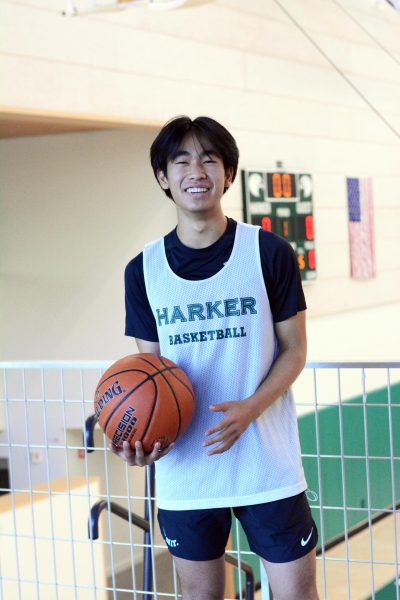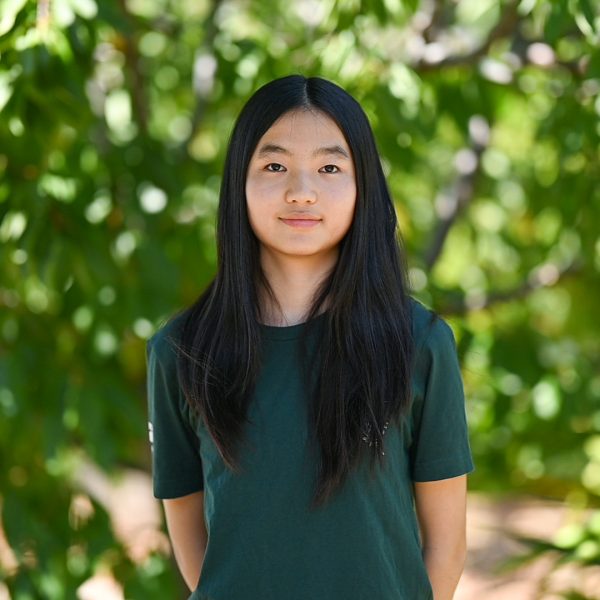
Shouts ring through the air, interspersed by intermittent thuds of ball against ground and the squeaks of sneakers against the gymnasium floor. An unclaimed ball flies through the air. In an orange blur, a pair of hands deftly guide it back onto the ground, where it ricochets back into a firm grip. Justin Chao (12) dribbles the recovered ball, crosses the court in lengthy strides, and makes a strategic pass to his teammate. Though his teammate will make the shot, Justin aides in the scoring process, guiding synergy within the team.
At the age of seven, Justin started playing basketball as an extracurricular. Since then, he learned to relish in the teamwork of the sport by strengthening the friendships and bonds he builds on the court.
“My favorite part about basketball is the social aspect,” Justin said. “I really enjoy getting to meet a myriad of different people, people I would have never met if I never started playing basketball. The team aspect is very special to me. I don’t think I’d have as much fun doing something like track or any solo sport. It’s very fulfilling to me to work with other people and have that team aspect.”
On the varsity boys basketball team, Justin plays as point guard, controlling the flow of the game. He plays a key role in guiding the team by distributing the ball to teammates throughout the game and driving the team to act on the offense.
“On the court he’s very focused and when he puts his mind to something and really goes into his ‘grind mode’ as he calls it, then he’ll get work done and off the court,” close friend Andrew Smith (12) said. “He is incredibly dedicated when he is in the zone.”
Basketball team captain Om Tandon (12) is keen on Justin’s abilities on the court, both as a point guard in-game and as a teammate in general. Justin constantly helps his teammates improve their playing and collaboration with his leadership and guidance on the court.
“Justin’s one of the best defensive players I’ve ever seen, and that’s because he has this aggression and this natural feel for the game that I haven’t really seen out of anybody else I play with,” Om said. “He’s very vocal on the court. He’s not afraid to call someone out when they’re not doing what they’re supposed to be doing.”
As a leader during games, Justin prioritizes the wellbeing of the team over his own personal feelings. In doing so, he guides his teammates to also consider the team as a whole. Though he used to get caught up in his emotions after a loss, Justin learned to encourage communication between his teammates to help share stress from the sport and diffuse tension in the moments leading up to a game.
“A lot of [teamwork] is just communication,” Justin said. “When you’re bottling up these emotions and not telling anyone about how you’re feeling, it’s easy to get lost in it and be consumed by your emotion. But when you’re open and outward with your emotions and you’re expressing them, it makes it a lot easier to process. It’s about being a leader and taking the initiative to not care about petty stuff. You have to prioritize the team.”
In his junior year, Justin opted to step back from playing on the basketball team. Without basketball, Justin felt as if he lost the driving force in his life. However, the year-long break from basketball ultimately helped Justin strengthen his relationship with the sport.
“It was difficult,” Justin said. “That was probably the most rock bottom I’ve been in my life. I had to find different facets to deal with my emotions. It used to be that basketball was my filter, I would go bring someone with me and hoop it out. My entire identity became basketball. When I lost that piece of my identity, it became such a devastating thing to me, and that’s why I hit rock bottom.”
The hiatus was a struggle for Justin as he had played nonstop for nearly a decade before junior year. Simultaneously practicing with multiple teams since middle school, whisked from practice to game to practice on a daily basis, Justin found that his affinity for basketball grew into more of a duty, rather than a beloved part of his identity. After spending a year away from the activity he loved, Justin rekindled his passion for the sport; realizing why he loved basketball in the first place, Justin remembered his passion for the sport’s social aspects, stress relieving qualities and the flow of teamwork and communication on the court.
“For me, I realized that for one, I’d lost my love for the sport, and just didn’t know what I was doing,” Justin said. “As life went on, to be good in the sport again, to genuinely be the most competitive person I could become and the best version of myself in basketball, I had to really love it for myself.”
Justin’s love for basketball shows itself not only in his passion while playing on the court but also within his own self-drive towards self-improvement and perseverance. Max Xing (12), teammate and friend, noticed these traits in his years of playing with Justin.
“The mark of hischaracter is how he bounced back from junior year. One of the things I admire about him is that even though he had a down year and not much was going his way, he didn’t give up,” Max said. “Just playing basketball with him, honestly on the court, off the court I can see just how much drive he has and his desire to win.”
This year, Justin returned to the team for the season and plans to continue playing in the future. He drew his eyes away from titles, losses and numbers that toyed with his morale. Instead, he now looks back to his energetic second-grade self, who played basketball for the sole purpose of enjoyment.
“Even when you’re trying to be the best, and you want to be really competitive, you can never be the best if you forget why you love doing it in the first place,” Justin said. “Just to keep playing, it’s finding the love for basketball I had when I was a lot younger. When you try so hard at something and you’re really competitive, you start to lose those fun and enjoyable aspects of doing what you love doing. What motivates me is my passion for the sport.”


















![“[Building nerf blasters] became this outlet of creativity for me that hasn't been matched by anything else. The process [of] making a build complete to your desire is such a painstakingly difficult process, but I've had to learn from [the skills needed from] soldering to proper painting. There's so many different options for everything, if you think about it, it exists. The best part is [that] if it doesn't exist, you can build it yourself," Ishaan Parate said.](https://harkeraquila.com/wp-content/uploads/2022/08/DSC_8149-900x604.jpg)




![“When I came into high school, I was ready to be a follower. But DECA was a game changer for me. It helped me overcome my fear of public speaking, and it's played such a major role in who I've become today. To be able to successfully lead a chapter of 150 students, an officer team and be one of the upperclassmen I once really admired is something I'm [really] proud of,” Anvitha Tummala ('21) said.](https://harkeraquila.com/wp-content/uploads/2021/07/Screen-Shot-2021-07-25-at-9.50.05-AM-900x594.png)







![“I think getting up in the morning and having a sense of purpose [is exciting]. I think without a certain amount of drive, life is kind of obsolete and mundane, and I think having that every single day is what makes each day unique and kind of makes life exciting,” Neymika Jain (12) said.](https://harkeraquila.com/wp-content/uploads/2017/06/Screen-Shot-2017-06-03-at-4.54.16-PM.png)








![“My slogan is ‘slow feet, don’t eat, and I’m hungry.’ You need to run fast to get where you are–you aren't going to get those championships if you aren't fast,” Angel Cervantes (12) said. “I want to do well in school on my tests and in track and win championships for my team. I live by that, [and] I can do that anywhere: in the classroom or on the field.”](https://harkeraquila.com/wp-content/uploads/2018/06/DSC5146-900x601.jpg)
![“[Volleyball has] taught me how to fall correctly, and another thing it taught is that you don’t have to be the best at something to be good at it. If you just hit the ball in a smart way, then it still scores points and you’re good at it. You could be a background player and still make a much bigger impact on the team than you would think,” Anya Gert (’20) said.](https://harkeraquila.com/wp-content/uploads/2020/06/AnnaGert_JinTuan_HoHPhotoEdited-600x900.jpeg)

![“I'm not nearly there yet, but [my confidence has] definitely been getting better since I was pretty shy and timid coming into Harker my freshman year. I know that there's a lot of people that are really confident in what they do, and I really admire them. Everyone's so driven and that has really pushed me to kind of try to find my own place in high school and be more confident,” Alyssa Huang (’20) said.](https://harkeraquila.com/wp-content/uploads/2020/06/AlyssaHuang_EmilyChen_HoHPhoto-900x749.jpeg)



